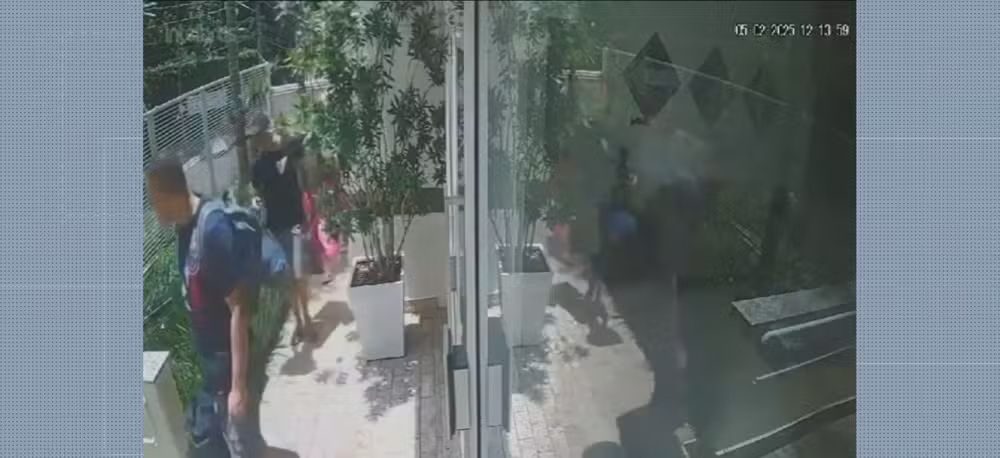Criminals used a short-term rental platform to stay in a residential condominium in Vila Andrade, in São Paulo’s South Zone. Over three days, they monitored residents’ routines and, upon identifying vacant apartments, burglarized at least four units. The crime occurred last week and was captured by the building’s security cameras, which recorded the suspects leaving the premises carrying luggage filled with stolen goods. The São Paulo Public Security Department confirmed the incident and stated that investigations are ongoing to identify and apprehend those involved. Among the stolen items, a jersey autographed by Pelé and worn during the 1970 FIFA World Cup stands out.
This type of criminal activity exposes a growing scheme being increasingly used in major Brazilian cities. The use of digital rental platforms for short stays has become a loophole exploited by criminals who pose as regular guests. Once inside, they study the movements of permanent residents, looking for opportunities to act unnoticed.
The criminals’ strategy includes making intercom calls to several units to confirm if they are empty. Once they verify the absence of occupants, they break in and steal valuable items. The ease of renting an apartment through online platforms, without strict identity verification, has contributed to the increase in such crimes.

Rise in burglaries using digital rental platforms
Similar crimes have been reported in other areas, indicating a repeating pattern. In December 2024, a gang used the same strategy in a condominium in Itaim Bibi, São Paulo’s West Zone. In that case, the criminals rented an apartment for a short period and, after monitoring residents’ habits, stole valuable belongings from vacant units. The estimated loss was around R$ 20,000.
Another case occurred in March 2024 when a group booked a luxury condo in São Paulo’s North Zone through a rental platform. Over 15 days, they studied the building’s security and eventually broke into two apartments, stealing jewelry, cash, and electronics.
Due to the increasing frequency of these crimes, security experts recommend stricter security policies in condominiums and improved regulations for short-term rentals on digital platforms.
How criminals operate
The suspects adopt various tactics to remain undetected and ensure a successful crime. Some of the most common methods include:
- Short-term stays: Booking apartments for only a few days to minimize exposure.
- Discreet surveillance: Observing residents’ routines to identify movement patterns.
- Intercom probing: Calling multiple units to check for empty apartments before acting.
- Careful exit strategy: Leaving the building carrying luggage to simulate a normal departure.
Preventive measures for condominiums
To prevent similar scams, property managers and condominium administrators should implement stricter security protocols, such as:
- Rigorous guest registration: Requiring documents and reservation proof.
- Constant surveillance: Investing in security cameras in strategic areas.
- Access control: Requiring prior authorization from property owners for short-term guests.
- Resident awareness campaigns: Educating occupants on potential risks and encouraging them to report suspicious activity.
The impact of short-term rentals on security
The rise of digital short-term rental platforms has introduced significant security challenges for residential buildings. The lack of specific regulations allows temporary tenants easy access to condominiums, often without the knowledge of property managers or administrators.
The issue is even more concerning in buildings without clear rules on short-term rentals. In many cases, doormen are not instructed to verify the identity of incoming guests, allowing anyone with a booking to enter shared areas freely.
This lack of oversight creates vulnerabilities for burglaries, unauthorized access, and concerns about temporary tenants using common areas without regulation.
The role of rental platforms
As these incidents increase, digital rental platforms are expected to adopt stricter verification measures to prevent criminals from abusing the system. Some recommended actions include:
- Mandatory identity verification: Requiring ID submission and validation for guests.
- Booking history tracking: Creating a database to identify repeat offenders.
- Support for condominiums: Providing assistance in implementing security measures for short-term rentals.
Cases in other Brazilian cities
Burglaries in condominiums via short-term rentals are not exclusive to São Paulo. In Belo Horizonte, criminals used the same method in a high-end residential building in the Lourdes neighborhood. While staying in the apartment, they stole luxury items, including jewelry and designer watches.
In Rio de Janeiro, gangs have also exploited this security loophole in neighborhoods such as Copacabana and Ipanema. In one case, the suspects posed as foreign tourists, booked a luxury apartment, and robbed nearby units.
What authorities say
Law enforcement agencies are closely monitoring the rise of these crimes and emphasize the importance of prompt reports to identify and arrest those responsible. The São Paulo Public Security Department confirmed that investigations into the Vila Andrade case are ongoing, with security footage being analyzed to track down the perpetrators.
The Civil Police have advised that condominium managers and administrators maintain direct communication with residents and encourage proactive security measures.
Strategies to minimize risks
Security experts suggest several actions that can help reduce burglary risks in condominiums that allow short-term rentals:
- Implementation of facial recognition or biometric security systems.
- Training staff to detect and respond to suspicious activities.
- Requiring prior registration of short-term tenants with the building administration.
- Creating security groups among residents for real-time information sharing.
Debates on regulation of short-term rentals
The lack of specific laws for short-term rentals raises debates about the responsibility of platforms and landlords. While some cities are considering measures to restrict the practice in residential buildings, others advocate for regulation as a way to enhance security.
Experts argue that the solution lies in balancing property owners’ rights to rent their units with the safety and protection of permanent residents.
Data on condominium burglaries
Statistics indicate that burglaries in condominiums represent a significant portion of property crimes in major cities. According to São Paulo’s Public Security Department, more than 8,000 reports of condominium burglaries were registered in the capital in 2024 alone.
The growing number of these cases calls for increased awareness and preventive actions from authorities and society to prevent criminals from continuing to exploit security loopholes.
Final thoughts
The Vila Andrade case is another example of the vulnerabilities in residential buildings regarding the misuse of short-term rental platforms. Addressing this issue requires the combined efforts of residents, property managers, administrators, and authorities to ensure effective measures are put in place to safeguard residents and their belongings.

Criminals used a short-term rental platform to stay in a residential condominium in Vila Andrade, in São Paulo’s South Zone. Over three days, they monitored residents’ routines and, upon identifying vacant apartments, burglarized at least four units. The crime occurred last week and was captured by the building’s security cameras, which recorded the suspects leaving the premises carrying luggage filled with stolen goods. The São Paulo Public Security Department confirmed the incident and stated that investigations are ongoing to identify and apprehend those involved. Among the stolen items, a jersey autographed by Pelé and worn during the 1970 FIFA World Cup stands out.
This type of criminal activity exposes a growing scheme being increasingly used in major Brazilian cities. The use of digital rental platforms for short stays has become a loophole exploited by criminals who pose as regular guests. Once inside, they study the movements of permanent residents, looking for opportunities to act unnoticed.
The criminals’ strategy includes making intercom calls to several units to confirm if they are empty. Once they verify the absence of occupants, they break in and steal valuable items. The ease of renting an apartment through online platforms, without strict identity verification, has contributed to the increase in such crimes.

Rise in burglaries using digital rental platforms
Similar crimes have been reported in other areas, indicating a repeating pattern. In December 2024, a gang used the same strategy in a condominium in Itaim Bibi, São Paulo’s West Zone. In that case, the criminals rented an apartment for a short period and, after monitoring residents’ habits, stole valuable belongings from vacant units. The estimated loss was around R$ 20,000.
Another case occurred in March 2024 when a group booked a luxury condo in São Paulo’s North Zone through a rental platform. Over 15 days, they studied the building’s security and eventually broke into two apartments, stealing jewelry, cash, and electronics.
Due to the increasing frequency of these crimes, security experts recommend stricter security policies in condominiums and improved regulations for short-term rentals on digital platforms.
How criminals operate
The suspects adopt various tactics to remain undetected and ensure a successful crime. Some of the most common methods include:
- Short-term stays: Booking apartments for only a few days to minimize exposure.
- Discreet surveillance: Observing residents’ routines to identify movement patterns.
- Intercom probing: Calling multiple units to check for empty apartments before acting.
- Careful exit strategy: Leaving the building carrying luggage to simulate a normal departure.
Preventive measures for condominiums
To prevent similar scams, property managers and condominium administrators should implement stricter security protocols, such as:
- Rigorous guest registration: Requiring documents and reservation proof.
- Constant surveillance: Investing in security cameras in strategic areas.
- Access control: Requiring prior authorization from property owners for short-term guests.
- Resident awareness campaigns: Educating occupants on potential risks and encouraging them to report suspicious activity.
The impact of short-term rentals on security
The rise of digital short-term rental platforms has introduced significant security challenges for residential buildings. The lack of specific regulations allows temporary tenants easy access to condominiums, often without the knowledge of property managers or administrators.
The issue is even more concerning in buildings without clear rules on short-term rentals. In many cases, doormen are not instructed to verify the identity of incoming guests, allowing anyone with a booking to enter shared areas freely.
This lack of oversight creates vulnerabilities for burglaries, unauthorized access, and concerns about temporary tenants using common areas without regulation.
The role of rental platforms
As these incidents increase, digital rental platforms are expected to adopt stricter verification measures to prevent criminals from abusing the system. Some recommended actions include:
- Mandatory identity verification: Requiring ID submission and validation for guests.
- Booking history tracking: Creating a database to identify repeat offenders.
- Support for condominiums: Providing assistance in implementing security measures for short-term rentals.
Cases in other Brazilian cities
Burglaries in condominiums via short-term rentals are not exclusive to São Paulo. In Belo Horizonte, criminals used the same method in a high-end residential building in the Lourdes neighborhood. While staying in the apartment, they stole luxury items, including jewelry and designer watches.
In Rio de Janeiro, gangs have also exploited this security loophole in neighborhoods such as Copacabana and Ipanema. In one case, the suspects posed as foreign tourists, booked a luxury apartment, and robbed nearby units.
What authorities say
Law enforcement agencies are closely monitoring the rise of these crimes and emphasize the importance of prompt reports to identify and arrest those responsible. The São Paulo Public Security Department confirmed that investigations into the Vila Andrade case are ongoing, with security footage being analyzed to track down the perpetrators.
The Civil Police have advised that condominium managers and administrators maintain direct communication with residents and encourage proactive security measures.
Strategies to minimize risks
Security experts suggest several actions that can help reduce burglary risks in condominiums that allow short-term rentals:
- Implementation of facial recognition or biometric security systems.
- Training staff to detect and respond to suspicious activities.
- Requiring prior registration of short-term tenants with the building administration.
- Creating security groups among residents for real-time information sharing.
Debates on regulation of short-term rentals
The lack of specific laws for short-term rentals raises debates about the responsibility of platforms and landlords. While some cities are considering measures to restrict the practice in residential buildings, others advocate for regulation as a way to enhance security.
Experts argue that the solution lies in balancing property owners’ rights to rent their units with the safety and protection of permanent residents.
Data on condominium burglaries
Statistics indicate that burglaries in condominiums represent a significant portion of property crimes in major cities. According to São Paulo’s Public Security Department, more than 8,000 reports of condominium burglaries were registered in the capital in 2024 alone.
The growing number of these cases calls for increased awareness and preventive actions from authorities and society to prevent criminals from continuing to exploit security loopholes.
Final thoughts
The Vila Andrade case is another example of the vulnerabilities in residential buildings regarding the misuse of short-term rental platforms. Addressing this issue requires the combined efforts of residents, property managers, administrators, and authorities to ensure effective measures are put in place to safeguard residents and their belongings.







